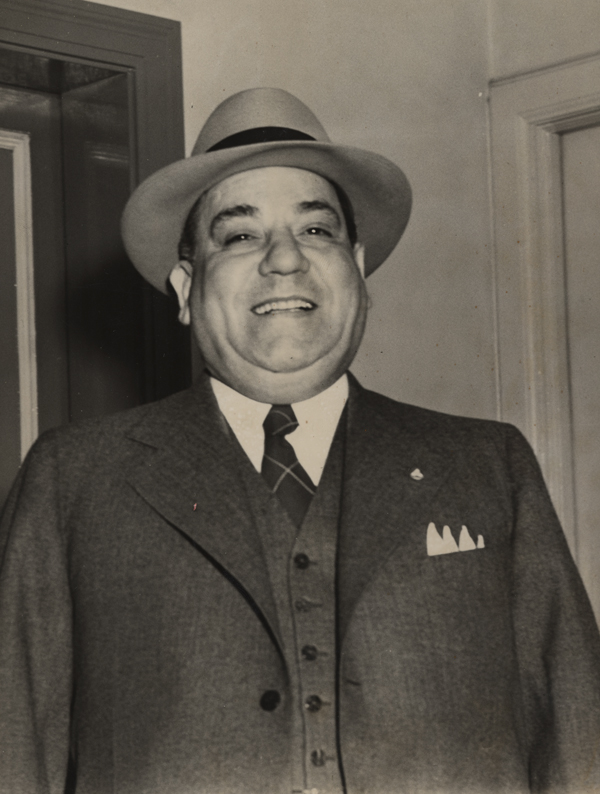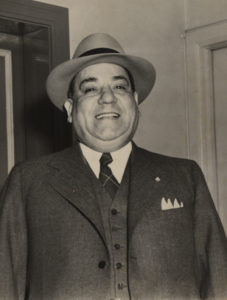Robert Maestri
Robert Maestri was mayor of New Orleans from 1936 to 1946 and became a powerful crony to fraternal governors Huey Long and Earl Long.

Courtesy of Louisiana State Museum
Mayor Maestri. Unidentified
Robert Maestri was mayor of New Orleans from 1936 to 1946 and became a powerful crony to fraternal governors Huey Long and Earl Long. Born to Italian immigrants in New Orleans on December 11, 1889, Maestri’s schooling ended in the third grade, but he had a shrewd business sense and ambitious political drive. He inherited his father’s furniture store and invested the profits in real estate. Eventually he owned five hundred houses and commercial properties worth millions of dollars. Craving power as well as wealth, Maestri held various public offices, culminating in his mayoralty and his central role in the Long political machine.
Maestri entered Huey Long’s inner circle by donating an extravagant sum, $40,000, to Long’s 1928 gubernatorial campaign, and he continued to lavish money on the “Kingfish,” as Louisiana’s flamboyant Depression-era governor came to be known. The generous backer was rewarded for his campaign gifts with an appointment to the Office of Conservation Commissioner in 1929, a position that included supervising Louisiana’s oil industry. By allowing oil companies to produce in excess of state quotas in exchange for campaign contributions, Maestri opened the sluices for the Long political machine’s well-lubricated revenue stream. When Long was assassinated in 1935, Maestri covered some significant costs of the burial, purchasing the tuxedo that clothed Long’s body and the $5,000 bronze casket in which he lay in state.
After Long’s death, Maestri and his associates, hotel executive Seymour Weiss, New Orleans Levee Board President Abe Shushan, and Earl Long, wrested control of the Long machine from competing factions. With the power to determine the outcome of local and state elections in Louisiana, in 1936 the Longites installed Richard W. Leche as governor and Earl Long as lieutenant governor. Determined to end the feud between Louisiana and President Franklin D. Roosevelt’s administration, which emanated from Huey Long’s criticism of the president and his own aspirations for the White House, Maestri and his allies backed Roosevelt and the New Deal. In return, the Roosevelt administration infused badly needed federal money into Louisiana for public works and dampened the enthusiasm of its prosecutors for probing corruption in the state.
Maestri’s ascension to the mayor’s office in New Orleans originated with a long-running feud between Huey Long and then-mayor T. Semmes Walmsley. That acrimony began with Walmsley’s support of an attempt to impeach Long as governor in 1929. After Long’s powerful showing in his 1930 US Senate election, Walmsley and his New Orleans political faction, the Old Regular Democratic Organization, mended fences with Long. The tenuous alliance lasted until 1933, when Walmsley broke the truce by running for reelection as mayor. Walmsley won the election, and Long retaliated by orchestrating a wave of new legislation that stripped the mayor and the rest of city government of much of their power. After Walmsley championed an anti-Long rally in Baton Rouge in the summer of 1934, Long sent thousands of National Guard troops into New Orleans and declared martial law. An armed showdown with New Orleans police eventually was averted, but Long continued to instigate legislative controls on city budgets and practices. Under prolonged pressure from the city council and the Old Regular political machine, Walmsley resigned in 1936. Maestri became the Democratic nominee in the special election to replace Walmsley, marking a renewed alliance between the Longites and Old Regulars. When the Republican candidate for mayor withdrew from the campaign, Maestri was proclaimed mayor on August 17, 1936, and he became the de facto boss of the city’s Democratic political machine.
Under the Maestri administration, New Orleans regained financial solvency and obtained massive federal funding for a new Charity Hospital, housing projects, and improved sewers and drainage. Maestri also nurtured gambling and prostitution, instructing police to turn a blind eye, even when a bookmaking operation was installed in the Third Precinct police station. The Long-controlled legislature extended Maestri’s term as mayor for two years, and he easily won his first election in 1942 against reform candidates Herve Racivitch and Shirley Wimberley.
Maestri was popular during his early years as mayor, meeting with citizens to hear their concerns and touring the city in search of problems to fix. Patronage money trickled down into the wards, insuring the fealty of community leaders. After 1942, however, Maestri withdrew from the public spotlight and concentrated on running the Longite/Old Regulars machine in New Orleans. Dissatisfaction grew as city services declined. In January 1946 Maestri lost his reelection bid to Chep Morrison, a young war veteran.
Maestri was the butt of good-natured humor during his public career for his earthy, uncultivated manner, which is best remembered from a dinner he shared with President Roosevelt at Antoine’s Restaurant in the French Quarter in 1937. As the president dined on a dish of Antoine’s renowned Oysters Rockefeller, Maestri famously leaned over to the chief executive and inquired, “How ya like dem ersters?” Despite his wealth and power, Maestri remained insecure due to his lack of education and social polish. After his defeat in 1946, his role in Louisiana politics diminished. He died on May 6, 1974.
